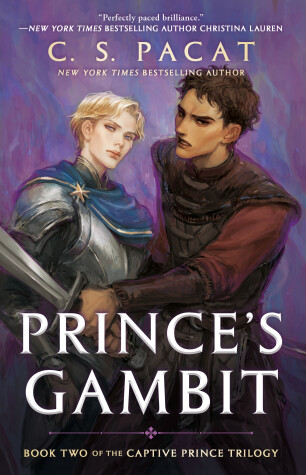Get out of here with your enemies-to-lovers trope if it doesn’t play out like this one. Get out of here if the enemy and the lover isn’t Laurent.
This whole book is troop movements and teamwork and Machiavellian plotting and ragtag adventures and it’s all foreplay and it kills me how good it is.
It’s even got me convinced that the slowest of slow burns is the best thing that could happen when the slowest of slow burns is rarely my thing.
I’m really into the clash of these cultures. It feels realistic, not like modern sensibilities playing dress up. I buy it. It’s making these guys re-examine their assumptions without feeling preachy or cloying, and yet neither culture is the superior one.
I am also not getting tired of these Laurent descriptions.
Laurent, who had arrived like a wasp at an outdoor feast, annoying everybody.
---
It was rare to associate Laurent with a physical body at all: you were always dealing with a mind.
---
“It’s not safe for you here. Too many people want to kill you.”
After a moment, Laurent said, “Everyone to the south, but only half the people to the north.”
---
Damen now knew the precise number of arrows Laurent needed to have trained on him in order to shut him up. It was six.
The dialogue. The adventure. The battles. THE ENDING. Next book now before it kills me for good.
“Old friend, you have come to a place where nothing is as any of us thought.”
- - -
Thoughts upon re-read, the second:
1. I didn’t think it was possible to love this book more. Spoiler: it’s possible. The banter. The intrigue. The walls that are crumbling all around Laurent. Damen’s love of the ridiculous. It’s even better the second time, knowing how it all threads together.
2. I normally don’t like slow burns because it’s constant (often idiotic) setbacks. I love this slow burn because there isn’t a setback in sight. Each time the thing you want to happen doesn’t happen, something better happens instead, and the bond deepens in equally satisfying ways. Even the sidestepping becomes an important insight into what’s going on.
3. Damen and Laurent have maybe two scenes apart the whole book? I exaggerate, but not really. There’s no filler; not the kind that’s a drag, anyway. What would normally be filler advances the characters until there isn’t a page I can skip.
4. I blazed through this too fast the first time to fully appreciate how soon and how much they like each other as people, and it’s much sooner and much more than they’re ready for. I’d even argue that happens in book one.
5. Aimeric really got to me this time. And Jord. But especially Aimeric. A fourth son, thought Damen, waiting for someone to notice him. When he wasn’t trying to please, he was baiting authority, as though negative attention could substitute for the approval he sought.
6. THE ENDING. (And I’m calling everything from chapter 17 onwards THE ENDING.)
7. It really does need to happen, though, the scene with Aimeric at Ravenel, where they get interrupted on the battlements and Damen can feel it all spiraling out of control. It’s Laurent at his cruelest— which isn’t as cruel as you think once you know the context— but Damen calls him on it, and then sticks by him, undaunted, rebuilding and defending Laurent’s walls himself. It makes what comes next— when Laurent finally surrenders— so devastatingly tender.
8. THE ENDING.
- - -
Thoughts upon re-read, the third:
This is going to be one of my touchstones for a while, where I keep going back to it, and back to it and back, for as long as it’s speaking to me.
Also, I need a Return of the King-length movie with Louis Hofmann as Laurent. How can I make this happen?
